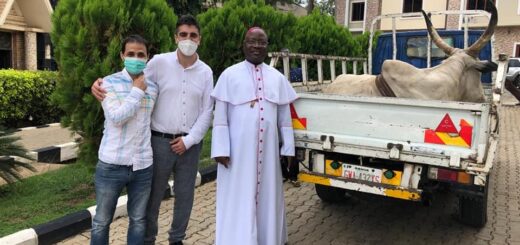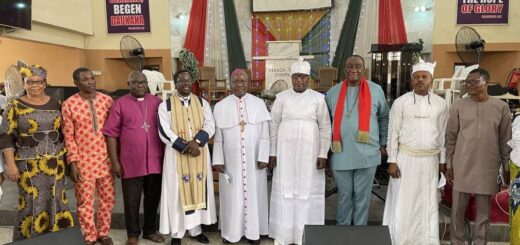God as a generous provider
by ARCH BISHOP · July 25, 2021
SEVENTEENTH SUNDAY, YEAR B, SUNDAY IN HONOUR OF GRAND PARENTS AND THE ELDERLY, ST. LUKE’S PARISH, KUBWA, ABUJA, JULY 25, 2021. HOMILY BY ARCHBISHOP I. A. KAIGAMA
READINGS: 2 Kgs. 4:42-44; Ps. 144(145): 10-11; 15-18; Eph. 4:1-6; Jn. 6:1-15
Today’s readings present to us the image of God as a generous provider. In our first reading, by invoking God’s power, Prophet Elisha fed one hundred men with twenty barley loaves. A farmer from Baal-shalishah performing his religious obligation brought the first fruits of his harvest to Elisha, and keeping in mind the providential care of God, Elisha commanded his servant to give the loaves to all those present. Even though Elisha’s servant felt it would be insufficient, there was not only plenty of food for a hundred others, but there was so much left over.
The nameless man from Baal-shalishah challenges us today to always extend a hand of charity and generosity to those around us. In a time like ours, characterized by individualism and selfishness, we are reminded that it is truly more blessed to give than to receive (cf. Acts 20:35). According to St. Paul in Ephesians 4:2, we must develop the spirit of generosity, humility, complete selflessness and patience towards one another, and learn to share in each other’s burdens of life.
In the Gospel, moved by compassion for His flock, Jesus fed more than five thousand people with five loaves of bread and two fish. Jesus cared in the past, He cares today, and He will care in the future for our physical and spiritual needs. Both Elisha and Jesus faced a crowd of hungry people and showed deep compassion.
The escalation in the prices of foodstuff today has made it difficult for the poor among us to feed. My cook, Mr. Sunday Emola, showed me some current food prices from Garki market in Abuja: one measure each of garri costs N500, beans – N1,000, rice – N1,000, 1 bag (10kg) of semovita – N5,500, one bottle of groundnut oil – N1,600, one bottle of palm oil – N1,300, one tuber of yam – N1,300, a medium basket of tomatoes – N3,500, 1 gallon of kerosene – N2,000, Alebo – N500, etc.
The problem in Nigeria is not whether we have resources to share, but the willingness to share them fairly, honestly and charitably. Both first reading and the Gospel emphasize the fact that the power to end the hunger and suffering of other people lies in our ability to share the little we have. We often forget how far-reaching the little we each possess shared generously can satisfy the needs of other people. Often, we assume that it is the task for the government or the United Nations or NGOs; but a lot can be done with our little if we focus on the person in need and the intention rather than the quantity of what is available. I understand that 2.2 million farmers will soon receive N12.3 billion as agricultural subsidy from the Federal Government. We hope that the money of this laudable initiative will get directly into the hands of the farmers and not to be diverted like other interventions or palliative measures.
As Christ continues caring for us in the Eucharist and in His Word, so must we continue caring for one another. This spirit of caring and giving is more urgent today as we celebrate the First World Day for Grandparents and the Elderly, established by Pope Francis. In his message to mark the day, the Holy Father affirms the spiritual closeness of the Church to grandparents and the elderly with the consoling words of Jesus to His disciples, “I am with you always” (Mt. 28:20). The elderly are assured of the abiding presence of God who continues to accompany them on the journey of life, despite the difficulties and challenges associated with old age. They are reminded to tenaciously hold on to the faith and to pass it on to the young (cf. Amoris Laetitia no. 192).
Grandparents and the elderly are a source of wisdom. By passing on their knowledge, morals and values, they play a great role in the formation of a decent society. They are a strong link between the past, the present and the future. We must respect them and pray always for those of them who are sick and weak or suffering conditions associated with aging. Our practice of social distancing due to COVID-19 should not distance us from them. It is sad today to see lavish funerals organized for departed ones after they were allowed to live a life of loneliness, misery and neglect.
In these times of moral and social decay, grandparents and the elderly can teach us how to heal our wounded humanity; the spirit of sharing, in a nation where selfishness, corruption and the spate of crime and insecurity deprive many of the basic necessities of life; a nation that continues to take mind boggling financial loans without any corresponding impact on our quality of life; only to leave a fragile and perilous future for generations of our youths.
As grandparents and the elderly continue their earthly pilgrimage, we expect the Government to provide good social security for them even as we entrust them to the intercession of Saints Joachim and Anne, parents of the Blessed Virgin Mary, and grandparents of Jesus. We also wish ourselves as we say in Nigeria, “long life and prosperity,” and a future with less hunger, corruption, injustice and the desecration and bastardization of human life.
The Family Commission and I decided to celebrate Mrs. Felicia Sani on her 84th birthday today as we honour grandparents and the elderly. Her generosity to and love for the Church is highly commendable.
May God continue to bless her and bless all of us too, so that we will always do “everything that is true, everything that is noble, everything that is good and pure … and everything that can be thought virtuous or worthy of praise” (Phil. 4:8).




